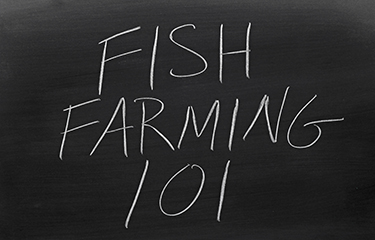When Kingfish Zeeland announced plans to build a recirculating aquaculture system (RAS) yellowtail farm in Jonesport, Maine, U.S.A., the company was met with overwhelming support from town officials and residents.
The Kats, Netherlands-based firm is planning to build a 15- to 20-acre, state-of-the-art RAS facility on a 90-acre waterfront site east of town. The decision comes alongside two larger RAS projects – those of Whole Oceans and Nordic Aquafarms – that have decided to settle in coastal Maine.
When the Kingfish Zeeland project was announced, no one was as excited as Mike Kelley, principal of Jonesport-Beals High School. For the past few years, Kelley has been working with the Downeast Institute – a marine laboratory and education center – to develop an aquaculture program at his high school; a program that he told SeafoodSource Kingfish Zeeland is expected to assist in.
Through a career and technical education track called Project Learning, the school has established programs that teach students work skills in welding, construction, culinary, and outdoor careers. Kelley wants to take advantage of the school’s location and local connections to help his students find jobs in the state’s growing aquaculture industry.
“A couple years ago, I had this epiphany – we’ve got the ocean right here,” Kelley told SeafoodSource. “Aquaculture is the future and it’s right in our backyard, so why not get our kids learning about it?”
The school had been working to design a curriculum, with the hopes of launching some classes next year.
“And then, lo and behold, I get word that Kingfish Zeeland is looking to set up shop here,” said Kelley. “It’s tremendous.”
Kelley said representatives from the aquaculture firm have lent their expertise already, visiting the school a handful of times over the past few months to discuss the curriculum. The company has offered its assistance in setting up tanks for the school, developing a work-study program over time, and giving tours of its facilities to students once they are up and running.
In Kapaau, Hawaii, a similar program is in the works at Kohala High School. Through a partnership with the Hawaii Institute of Pacific Agriculture, the school has been bringing resources, including staff time and funding, to reestablish a student farm on campus since 2017.
The school’s farm is multifaceted, including a market garden featuring kalo and heirloom vegetable varieties, a fruit tree orchard with 50 varietal fruit trees, and animal husbandry including a pig trap and a movable chicken coop. In the past year, the school has also introduced a hydroponics element to the coursework.
Kohala High School is one of the few farm programs in the state that is allowed to serve its produce in the school cafeteria, allowing students to sell their work back to the school.
According to Dean Snelling, an alumnus and the school's natural resource and productions instructor, Kohala High is looking to expand the program to include aquaculture in the near future. The school’s existing but nonfunctional aquaculture system was recently repaired thanks to local donations and is set to house a tilapia-growing operation. The system will have the capacity to produce 2,000 pounds of tilapia every six months that could potentially be served to students, according to West Hawaii Today.
“Agriculture is an up-and-coming industry throughout Hawaii,” Snelling told SeafoodSource. “Due to the island's isolation, there has been an emphasis in recent years to become more self-sustainable food-wise. Aquaculture is obviously an extension of that and there are some pretty innovative projects happening throughout the state.”
Snelling said the school’s hands-on approach to agriculture, and aquaculture down the road, is one that really resonates with his students.
“When we look at the technical aspects of farming and aquaculture and teach the students how to work out in the field, they definitely have a greater sense of ownership with their work,” Snelling said. “We’re hoping that spark they get here will carry them into future careers in these industries.”
Both schools are on the lookout for professionals with backgrounds in aquaculture to help build their programs.
“We’re excited to get this off the ground soon here,” Kelley said. “We’ve got to build a base for kids. Even kids living right on the ocean – they don’t know the big picture when it comes to this industry. They know they can go haul traps and catch lobster, but we’re trying to give them more options that allow them to work with the ocean and keep close to the coast.”
Photo courtesy of Tethys Imaging LLC/Shutterstock







